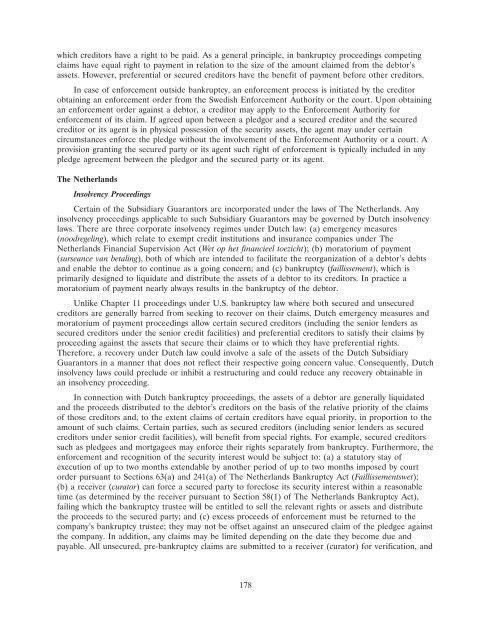Ardagh Glass Finance plc - Irish Stock Exchange
Ardagh Glass Finance plc - Irish Stock Exchange
Ardagh Glass Finance plc - Irish Stock Exchange
Create successful ePaper yourself
Turn your PDF publications into a flip-book with our unique Google optimized e-Paper software.
which creditors have a right to be paid. As a general principle, in bankruptcy proceedings competing<br />
claims have equal right to payment in relation to the size of the amount claimed from the debtor’s<br />
assets. However, preferential or secured creditors have the benefit of payment before other creditors.<br />
In case of enforcement outside bankruptcy, an enforcement process is initiated by the creditor<br />
obtaining an enforcement order from the Swedish Enforcement Authority or the court. Upon obtaining<br />
an enforcement order against a debtor, a creditor may apply to the Enforcement Authority for<br />
enforcement of its claim. If agreed upon between a pledgor and a secured creditor and the secured<br />
creditor or its agent is in physical possession of the security assets, the agent may under certain<br />
circumstances enforce the pledge without the involvement of the Enforcement Authority or a court. A<br />
provision granting the secured party or its agent such right of enforcement is typically included in any<br />
pledge agreement between the pledgor and the secured party or its agent.<br />
The Netherlands<br />
Insolvency Proceedings<br />
Certain of the Subsidiary Guarantors are incorporated under the laws of The Netherlands. Any<br />
insolvency proceedings applicable to such Subsidiary Guarantors may be governed by Dutch insolvency<br />
laws. There are three corporate insolvency regimes under Dutch law: (a) emergency measures<br />
(noodregeling), which relate to exempt credit institutions and insurance companies under The<br />
Netherlands Financial Supervision Act (Wet op het financieel toezicht); (b) moratorium of payment<br />
(surseance van betaling), both of which are intended to facilitate the reorganization of a debtor’s debts<br />
and enable the debtor to continue as a going concern; and (c) bankruptcy (faillissement), which is<br />
primarily designed to liquidate and distribute the assets of a debtor to its creditors. In practice a<br />
moratorium of payment nearly always results in the bankruptcy of the debtor.<br />
Unlike Chapter 11 proceedings under U.S. bankruptcy law where both secured and unsecured<br />
creditors are generally barred from seeking to recover on their claims, Dutch emergency measures and<br />
moratorium of payment proceedings allow certain secured creditors (including the senior lenders as<br />
secured creditors under the senior credit facilities) and preferential creditors to satisfy their claims by<br />
proceeding against the assets that secure their claims or to which they have preferential rights.<br />
Therefore, a recovery under Dutch law could involve a sale of the assets of the Dutch Subsidiary<br />
Guarantors in a manner that does not reflect their respective going concern value. Consequently, Dutch<br />
insolvency laws could preclude or inhibit a restructuring and could reduce any recovery obtainable in<br />
an insolvency proceeding.<br />
In connection with Dutch bankruptcy proceedings, the assets of a debtor are generally liquidated<br />
and the proceeds distributed to the debtor’s creditors on the basis of the relative priority of the claims<br />
of those creditors and, to the extent claims of certain creditors have equal priority, in proportion to the<br />
amount of such claims. Certain parties, such as secured creditors (including senior lenders as secured<br />
creditors under senior credit facilities), will benefit from special rights. For example, secured creditors<br />
such as pledgees and mortgagees may enforce their rights separately from bankruptcy. Furthermore, the<br />
enforcement and recognition of the security interest would be subject to: (a) a statutory stay of<br />
execution of up to two months extendable by another period of up to two months imposed by court<br />
order pursuant to Sections 63(a) and 241(a) of The Netherlands Bankruptcy Act (Faillissementswet);<br />
(b) a receiver (curator) can force a secured party to foreclose its security interest within a reasonable<br />
time (as determined by the receiver pursuant to Section 58(1) of The Netherlands Bankruptcy Act),<br />
failing which the bankruptcy trustee will be entitled to sell the relevant rights or assets and distribute<br />
the proceeds to the secured party; and (c) excess proceeds of enforcement must be returned to the<br />
company’s bankruptcy trustee; they may not be offset against an unsecured claim of the pledgee against<br />
the company. In addition, any claims may be limited depending on the date they become due and<br />
payable. All unsecured, pre-bankruptcy claims are submitted to a receiver (curator) for verification, and<br />
178
















